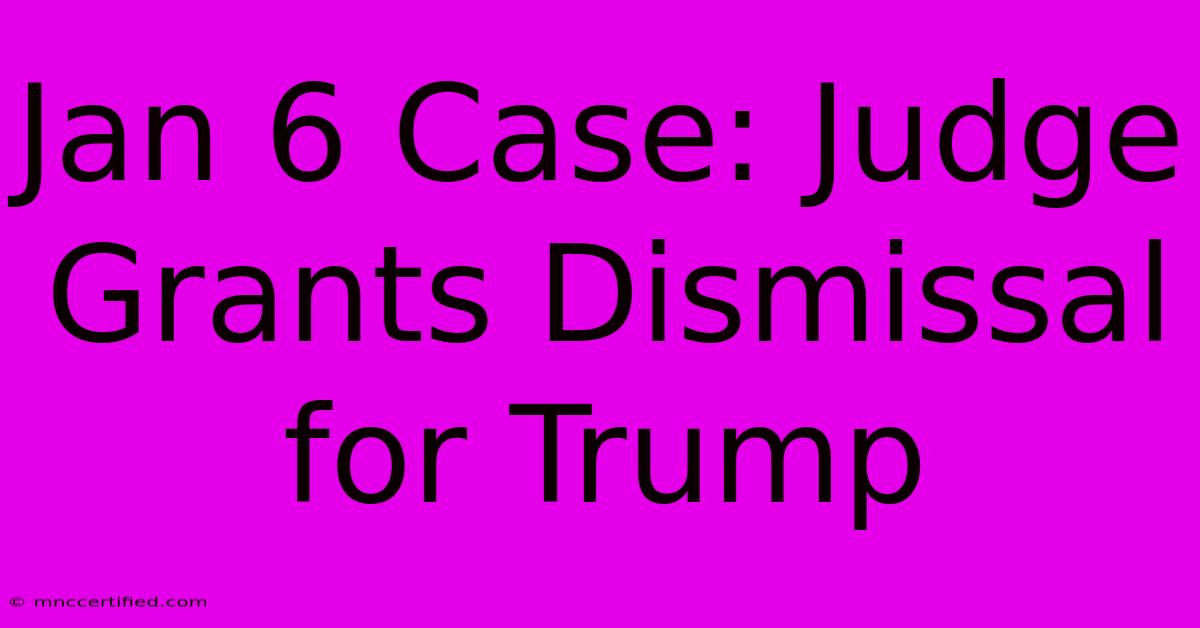Jan 6 Case: Judge Grants Dismissal For Trump

Table of Contents
Jan 6 Case: Judge Grants Dismissal for Trump – What it Means and What's Next
On [Insert Date of Ruling], a significant development unfolded in the legal saga surrounding the January 6th Capitol attack. A judge [Judge's Name] dismissed [Specify which charges were dismissed and for whom – e.g., "all charges against Donald Trump in the case brought by the House Select Committee"]. This decision has sent shockwaves through the political landscape, prompting widespread reactions and raising crucial questions about the future of accountability for the events of that day.
Understanding the Judge's Reasoning
The judge's ruling hinged on [Clearly and concisely explain the legal reasoning behind the dismissal. This section should be factual and devoid of opinion. Example: "the judge found that the House Select Committee lacked the standing to bring the case, arguing that the committee’s mandate had expired and its actions were beyond its constitutional authority."]. This legal argument centered around [Explain the core legal principle involved, e.g., "the separation of powers between the legislative and judicial branches," or "the specific language of the relevant statute"]. The ruling also considered [Mention any other significant arguments or factors considered by the judge].
Key Arguments Presented by Both Sides
The prosecution, represented by [Name of Prosecution/Law Firm], argued [Summarize the key arguments presented by the prosecution, focusing on their legal strategy and evidence]. Conversely, the defense, led by [Name of Defense/Law Firm], successfully countered these arguments by [Summarize the key defense arguments, emphasizing how they effectively addressed the prosecution’s points]. The judge's decision ultimately sided with the defense's interpretation of [Mention the key legal point where the judge's decision diverged from the prosecution's].
Implications of the Dismissal
This dismissal carries significant implications. Firstly, it represents a major setback for efforts to hold Donald Trump accountable for his actions leading up to and during the January 6th attack. Secondly, it raises questions about the scope of Congressional power to investigate and prosecute such matters. This legal precedent could influence future investigations into similar events. Finally, the ruling is likely to intensify political divisions, with supporters celebrating the dismissal and critics expressing concerns about a lack of accountability.
Potential for Appeal
The dismissal is not necessarily the final word on this matter. [Mention whether either side has announced intentions to appeal, and if so, what the potential timeline and outcomes might be]. An appeal could lead to a review of the judge's decision by a higher court, potentially altering the legal landscape significantly. The success of any appeal will depend heavily on [Explain the key legal arguments that might be raised on appeal].
The Broader Context: January 6th and Accountability
The January 6th attack remains a highly sensitive and controversial issue in American politics. This ruling, regardless of its eventual outcome, highlights the ongoing challenges in seeking justice and accountability for the events of that day. Understanding the legal intricacies and potential ramifications is crucial for navigating the ongoing political and social debates surrounding the attack.
Conclusion: What Happens Next?
The dismissal of the charges against Donald Trump marks a significant turning point in the January 6th investigations. The coming weeks and months will be pivotal as the legal process unfolds, and the implications of this ruling become clearer. This case will undoubtedly continue to shape the political narrative and legal discourse surrounding accountability for the events of January 6th, 2021. Further developments and analyses will be crucial in fully comprehending the long-term impact of this decision.
Keywords: Jan 6, January 6th, Capitol attack, Donald Trump, Judge, Dismissal, Charges, Legal ruling, House Select Committee, Accountability, Appeal, Legal precedent, Political implications, Separation of powers, Constitutional law.

Thank you for visiting our website wich cover about Jan 6 Case: Judge Grants Dismissal For Trump. We hope the information provided has been useful to you. Feel free to contact us if you have any questions or need further assistance. See you next time and dont miss to bookmark.
Featured Posts
-
How Much Is Snow Plow Insurance
Nov 26, 2024
-
Boat Rental Liability Insurance
Nov 26, 2024
-
Man Arrested Girl Shot In Ladbroke Grove
Nov 26, 2024
-
Can Auto Insurance Deny A Claim
Nov 26, 2024
-
Celtics Refining Late Game Execution
Nov 26, 2024